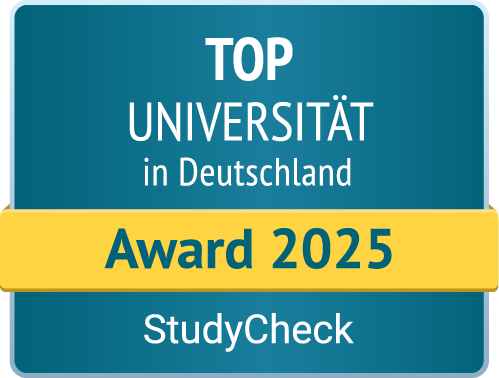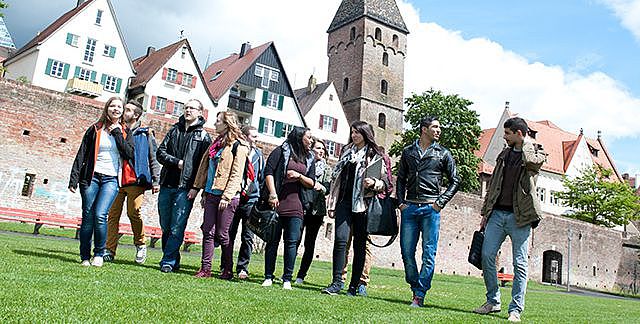Perfectly equipped
Our laboratories and classrooms are top notch. Because if you want to change something tomorrow, you shouldn't learn yesterday's lessons.

Neben den klassischen Lehrveranstaltungen erarbeitet sich der Studierende verschiedene Themengebiete auch in Projektform mit Seminar- und Praktikumsanteilen, um das Wissen nicht nur theoretisch zu vermitteln, sondern auch im praktischen Einsatz zu erfahren und lösungsorientiert umzusetzen, und um die Teamfähigkeit zu stärken. Neben den forschungsorientierten Projekten der Universität wird dabei insbesondere eine freiwillige Industriepraxis gefördert.
Master of Science (MSc)
120
4

Our laboratories and classrooms are top notch. Because if you want to change something tomorrow, you shouldn't learn yesterday's lessons.
The ratio of teachers to students in the engineering programs at Ulm University allows for excellent support.
There is a trusting relationship between students, professors, and assistants. The commitment of both the teachers and the student tutors from higher semesters is high and focused on the academic success of each individual student.
Advantages of studying with us: Small teaching and learning groups, focus-oriented master's program with a high degree of freedom of choice, participation in research projects, excellent hardware and software equipment, extensive e-learning offerings, participation of institutes with strong third-party funding in national and international technology research projects, high practical relevance of teaching
Industrially and academically funded research projects with budgets of several million euros per year Forward-looking topics in research and teaching such as:
■ Embedded and distributed Systems
■ Communication and Information Technology
■ Secure information Systems
■ Human-machine interaction
■ Vehicle systems
The Master's program in Communications and Computer Engineering builds on the skills learned in the Bachelor's program and enables students to specialize or pursue broad-based further education in several core areas. The aim is to train specialists who apply and further develop scientific methods to solve complex problems in the fields of electrical engineering, information technology, and computer science. The program covers both theoretical and practical content through projects, internships, and interdisciplinary specializations. The master's thesis allows students to work independently on a current research topic. Students can participate in international research teams.
Our master's degree graduates have acquired in-depth knowledge of engineering, mathematics, computer science, and natural sciences, enabling them to conduct scientific work and act responsibly. They are able to analyze scientific problems, abstract complex issues, and develop innovative methods for solving them. In addition, they can create new products, processes, and methods. They recognize information needs, plan investigations, and evaluate data. Their skills extend to systematically familiarizing themselves with new tasks and responsibly reflecting on the non-technical implications of their work.
The Master's program in Communications and Computer Engineering has a modular structure and is divided into five areas, known as module groups. Each of these module groups offers a selection of modules from the entire range of courses offered by the Engineering Sciences department or by the university as a whole. The module groups are:
1. Core modules
2. Advanced modules
3. Supplementary modules
4. Practical modules
5. And the research-oriented master's thesis
There are 10 modules to choose from as core modules; a minimum of 22LP (4 modules) must be completed from these core modules. In the Master's program in Communications and Computer Engineering, approximately half of the core modules are from electrical engineering and half from computer science, with 2 modules to be selected from each area. This ensures that students of Communications and Computer Engineering acquire in-depth skills in the fundamental subjects of both disciplines. In the Master's program in Information Systems Engineering, the core modules consist of the engineering fields of electronics, communications engineering, measurement technology, systems theory, and signal theory, as well as the fields of embedded systems, mobile computing, computer networks, and IT security from computer science. Building on the basic skills acquired in these areas in the bachelor's program, students expand their skills in a selectable part of the core modules.
The advanced modules enable students to specialize in one area or acquire broad skills in many disciplines. In the Master's program in Communications and Computer Engineering, all Master's modules in engineering and computer science are available for selection. At least 1/3 of the required credit points must be earned in engineering and computer science.
The supplementary modules allow students to acquire interdisciplinary skills. Here, modules can be chosen from the entire range of subjects offered by the University of Ulm – with a particular focus on skills in physics, mathematics, economics, psychology, medicine, or ASQ. This module group allows students to acquire targeted skills beyond their own subject area, particularly when focusing on a specific area.
The practical modules allow students to acquire practical skills. By setting a minimum of 10 credit points, the goal is achieved that students acquire advanced practical skills in their chosen focus area of the program through an industrial internship and a university project, or two university projects.
In addition to this framework for the master's program, elective specializations are defined. These specializations serve as guidelines for acquiring skills in a research area, assist students in planning their studies, and consist of a list of elective modules specified in the curriculum.
They are adapted to the research focus areas and are confirmed to students upon successful completion with their degree documents. They do not represent an obligation to complete the described modules in their entirety, thus allowing students to refocus the orientation of their individual studies.
The focus areas in the Master's program in Communications and Computer Engineering are:
Integrated and Embedded Systems
Learning Methods and Pattern Recognition
Human-Machine Interaction
Security in Information Systems
Computational Engineering
The focus areas and their module selection are defined in the general and specific study plans.

Semester abroad? Why not! Our exchange programmes offer various opportunities to meet people from different cultures and improve your language and intercultural skills. It is well worth your time to go abroad and expand your horizon, both on a personal and professional level.
The many international students on our campus also create an international flair. The International Office is here to support both incoming and outgoing students. The International Office offers international prospective students who wish to apply for a German-taught study programme at Ulm University, a preparatory course.

Studying and living in Ulm
Welcome to the most liveable city in Germany. Albert Einstein's birthplace is a unique combination of science, leisure, top employers and culture. Top locations and events such as the Ulmer Zelt, Nabada or the Donaufest attract visitors to the quaint streets. Here you feel at home!
Copyright: City of Ulm